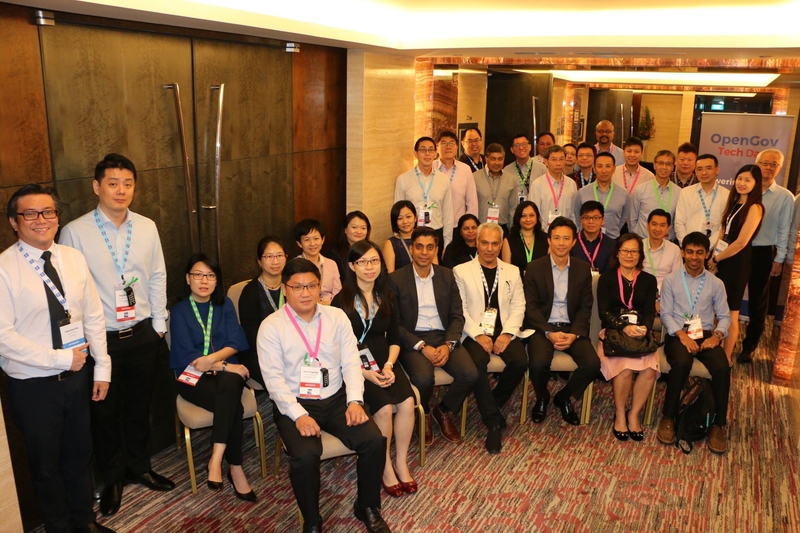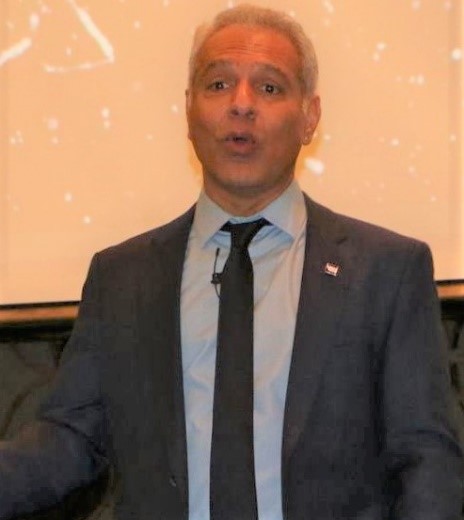
The OpenGov Tech Day- Powering smart nation initiatives through AI was held on 23 October 2019 at the Sheraton Towers. The event saw delegates from the public sector come together to discuss how AI can be efficiently leveraged to drive data-centric infrastructure to harness the power of AI.
Delegates were grouped into four teams where they participated in three rounds of gamification sessions and shared their perspectives of AI adoption in smart nations.
Unlearn What You Have Learned

- Mohit Sagar, Managing Director and Editor-in-Chief at OpenGov Asia addressed that artificial intelligence (AI) is of top priority in Singapore.
- He stressed that data must speak to each other, or we will be working in silos. “Interoperability is important,” he said.
- At the heart of it all, AI is a driving force of smart cities/nations.
- Mohit acknowledged that with the abundance of data, AI is often labelled at the “new oil”.
- He, however, debunked that statement. While oil gets stored and is used only when needed, data should be consistently accessed and used.
- A unified Hybrid Cloud is key to a successful digital transformation that supports smart nation initiatives. Mohit said that governments and agencies are often looking to put all their data on-premise. He stressed that not all data is the same and hence a hybrid cloud model- Data needs to be shared.
- Actionable intelligence of data is needed, and it should be implemented in a safe and responsible manner. That involves the ethical responsibilities of individuals and organisations. Mohit stressed that there must be a balance of technology and humanity.
- “Be ready to experiment, fail and learn,” he said.
It is Not Impossible to Adopt AI

- Sunil Chavan, Vice President, Flashblade Sales, Pure Storage, Asia Pacific and Japan gave a quick rundown on how AI powers a smart nation.
- He listed three key components for digital transformation: technology, human and government.
- Technology: Wireless infrastructure, IoT
- Human: Education
- Government: Support of government and policymakers
- He added that there are some challenges faced under the technology aspect: technology collaboration, real-time analysis, big data, and privacy and security. These aspects are crucial as they form the crux of AI.
- Sunil added that data is important for real-time analysis.
- He shared a case study of Barcelona using AI-smart irrigation systems to save water. Similarly, Amsterdam City is using flexible street lighting to facilitate sustainable and safe energy.
- These case studies show that it is not impossible to adopt AI.
- He stressed that AI-ready infrastructure and data-centric architecture (data being unified to be accessed for multiple processes) is an optimal combination for the most effective results.
- Sunil gave a quick insight as to how Pure Storage is taking the forefront for producing AI technology solutions.
- “The next generation is growing up with AI,” he said, reiterating the message that AI is here to enhance processes rather than to make them harder.
Polling Questions
Digital transformation and innovation are of the biggest priority for 74.2% of the delegates.
The key focus in the next 12 months for the organisations stands out to be modern real-time data analytics (45%). Interestingly, AI came close behind at 42% of votes.
A shortage of skilled personnel is the top challenge for organisations when embarking on data analytics and AI projects (61%).
62% of delegates said that structured data is the most important type of data to collect for the next smart nation initiative.
Regulatory compliance is seen as the biggest challenge in data management- 35.5%.
Gamification Sessions
The gamification session was broken down into three scenarios and three rounds of gamification. The first scenario staged delegates to be citizens of “Country Wakanda” where Smart Nation initiatives are being rolled out, with the focus on millennials.
Scenario 1 was about the senior citizen population increasingly consuming data on e-services, resulting in the slowing down of systems. Teams now must review their strategy framework to solve this issue.
As part of the gamification, the teams will be provided with a list of “one-lined” solutions that have already been pre-classified according to optimal/non-optimal answers, but the teams are unaware of what they are. The more optimal answers chosen by the teams as their recommended solutions, the more points they will receive.
Teams could also provide wild card answers where they will provide solutions of their own.
Gamification Session 1
 The first round saw exciting results where most groups chose 4/5 out of the 6 listed optimal answers.
The first round saw exciting results where most groups chose 4/5 out of the 6 listed optimal answers.
Batch-based processing- run batch, real-time and AI-processing on HDFS and separation of architecture- multiple data-lakes to support Hadoop and HDFS for the various e-services were the two most picked non-optimal answers as solutions.
A delegate explained that his team had chosen the former non-optimal answer as they believe that a problem-at-hand should be solved first before thinking ahead.
Sunil explained that with limitations of HDFS, using a separation of architecture is going to be repetitive. Batch based processing for identifying the requirements for new applications for modern real-time analytics is more data-centric.
A delegate explained that the timeline is a key factor for choosing this. Sunil said that long hours are not needed to create this change. Technology has shifted and changed so much to achieve this.
It was agreed that it is important to enable cost-effectiveness. A single data hub is efficient to store all your data in. With real-time analysis, the box does not fill and data does not overflow. This would allow for resource optimisation.
SingPass is an example of it but it is also important to take note that a single data platform should be done right to allow for a seamless experience.
Gamification Session 2
 Scenario 2 saw teams having to create a data hub to provide a single common platform.
Scenario 2 saw teams having to create a data hub to provide a single common platform.
“Redesign the affected e-services applications to achieve SLAs” and “use public cloud as a single data hub” were the two non-optimal answers which were chosen as optimal answers.
Open-sharing policy was suggested as a wild-card answer. The team explained that having a data hub is not only key, but you should also share data.
Data governance was another wild card answer. The team explained that it is crucial to ensure good data classification to manage risks for data security and data quality.
Reclassification of data according to what is fit for the public cloud and private cloud will reduce data leaks.
This will create a good data hub strategy.
As of hybrid cloud as a solution, teams agreed that data should be classified correctly according to what should be on-premise/off-prem. Not all data should be on-premise and not all should be on the public cloud.
Gamification Session 3
 The third scenario saw teams having to produce considerations for building an AI-ready infrastructure to support the launch of autonomous vehicles to complement the current public transport offerings.
The third scenario saw teams having to produce considerations for building an AI-ready infrastructure to support the launch of autonomous vehicles to complement the current public transport offerings.
This session saw most teams correctly identifying and selecting most of the optimal answers.
One of the teams explained their choice of “scalable- platform that supports multiple petabytes in a single namespace” as an optimal answer. They said that autonomous vehicles have many data access points. Hence, a common platform is needed for high-performance computing.
Green initiatives to lower carbon footprint with reduced rack space, power and cooling while an optimal answer was however not chosen by most teams. Sunil explained that with use space decreasing this allows for carbon footprints to decrease over time and for more efficiency.
It was suggested that there is a need to consider a collaboration of data with other agencies to decide what the minimum threshold of data is to power AI.
Cybersecurity defences should be prioritised on to ensure the security of data and IoT devices.
On the common idea that AI is taking jobs away, Sunil explained that it is more of a restructuring where people can now sit behind their desk and monitor the processes rather than being on-site.
AI ethics, being transparent, and re-skilling of talents are the three key guidelines to follow.
Conclusion
Delegates left the session with a clear perspective that AI-adoption is only imperative to driving processes to a better standard and will allow for efficiency. While work must be done in terms of incorporating AI into processes, the long-term results will be fruitful.
















